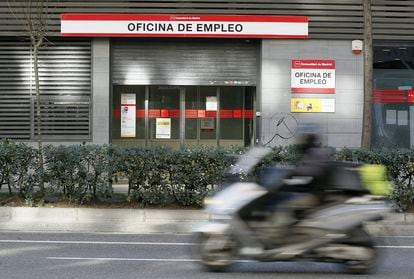Spanish economy shrank 17.8% in the second quarter due to coronavirus crisis
The decline is the largest since the 1930s, but not quite as bad as the National Statistics Institute had anticipated


The Spanish economy entered a technical recession in the second quarter of 2020 after recording a 17.8% fall in gross domestic product (GDP) between April and June. This is the largest quarterly drop since 1970, when the National Statistics Institute (INE) began the historical series. Nothing similar can be found on record since the days of the Spanish Civil War (1936-1939).
The decline, however, was slightly under what the INE had forecast in late July when, lacking complete data, it estimated that GDP would fall 18.5% in the second quarter. The year-on-year drop in GDP is now established at 21.5%, compared to the July forecast of 22.1%. Until now, the greatest annual slump in economic output had been recorded in the second quarter of 2009, in the middle of the financial crisis, when year-on-year growth fell by 4.4%.
Spain continues to be one of the countries hardest hit by the coronavirus crisis – only the United Kingdom has posted similar drops in output
The April-to-June period almost perfectly overlaps with the state of alarm that was declared in Spain to contain the spread of the coronavirus. The country was kept in a strict lockdown and many economic activities slowed down or ground to a complete halt, most notably in the tourism industry.
Spain continues to be one of the countries hardest hit by the coronavirus crisis, even as neighboring nations begin to review their GDP figures upwards. In Europe, only the United Kingdom has posted similar numbers, with a 21.7% drop in output, according to the most recent Eurostat data.
Other countries are posting somewhat less dramatic losses: Germany’s output shrank by 11.3%; France’s by 18.9%; Italy’s by 17.7%; Portugal’s by 16.3%; Greece’s by 15.5%; the Netherlands' by 9%; Austria’s by 12.9%; Denmark’s by 8.2%; Sweden’s by 7.7%; Ireland’s by 3.7% and Poland’s by 7.9%.
Two factors are being largely blamed for the Spanish figures: first, a stricter lockdown than in other countries, as evidenced by Google and Apple’s mobility data. And second, an economy that is more heavily dependent on the sectors that were hardest hit by the restrictions, chiefly hospitality, transportation, entertainment, and in general all activities requiring social interaction.
In terms of the importance of its tourism industry to the economy, only Greece can compare to Spain. And a study by the Organization for Economic Cooperation and Development (OECD) has shown that Spain is the country with the highest rate of jobs that are exposed to contagion.
English version by Susana Urra.
/cloudfront-eu-central-1.images.arcpublishing.com/prisa/52DWUUFLDNHDTKCES3DIKYD3CY.jpg)











































